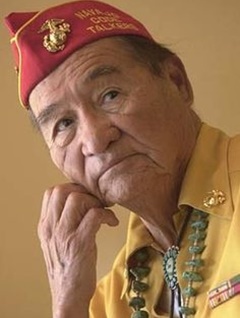BILLISON-SAMUEL
SAMUEL WILLIAM BILLISON

CPL

DECEASED, 11/17/2004
NAVAJO CODE TALKER
The importance of teaching and preserving languages was made critically clear during World War II when Navajo Indians from the American Southwest developed a code based on their native language that literally saved thousands of lives in the Pacific Theater. Called Navajo Code Talkers, the Native Americans were recruited after a marine commanding general in the Pacific was convinced by the son of a missionary who had grown up on a Navajo reservation of the value of a code based on the obscure tongue. Navajo is a complex, unwritten language that has no alphabet or symbols and includes guttural and nasal sounds, voice intonations, and dialects. Hard to speak, it proved to be an invaluable resource, and utterly confused the Japanese. No one ever broke the Navajo code, including Navajos who were not trained as code talkers.
Sam William Billison was born on the floor of a humble hogan, destined to be a sheepherder. He came from a traditional Navajo family, his father a sheepherder and medicine man, and his mother a rug-weaver. At the age of 4 he reportedly began his education at U.S. Government Indian boarding schools where the official policy was to teach the children to speak only English, and they were forbidden to speak their mother tongue and punished if they did so. When the Marine Corp found that the original group of Code Talkers could accurately decipher messages in minutes as compared to hours by traditional code methods the demand for additional Navajo speaking recruits quickly increased and Billison was one of the young men recruited into the program. Following recruit training and additional intensive instruction concerning the use of field radios and telephones in battle, Billison was one who survived the rigorous testing and able to memorize the difficult code without written notes. He was one of six code talkers assigned to the 5th Marine Division who were sent to Iwo Jima where they were credited with transmitting and decoding more than 800 error-free messages in a key 48-hours of the fierce 36-day battle for the island. Two code talkers were killed during the Iwo Jima battle but fortunately Billison escaped injury. Historians have said that without the Code Talkers the marines might not have been successful in seizing Iwo Jima.
As the story of the code talkers emerged decades after the war when the program was declassified, Billison became very active in describing the previously secretive program. By this time, with the GI Bill in hand, he earned a doctorate in education from the University of Arizona and has the distinction of being the first Navajo Code Talker to earn a doctorate degree. He went on to be a teacher, principal and administrator who helped reorganize the reservation education system under the Bureau of Indian Affairs. He was instrumental in helping to educate thousands of Navajo students throughout Oklahoma, Texas, New Mexico and Arizona. Additionally, he served on the Navajo National Council and in 1971, three years after their secretive work was finally declassified, he helped organize the Navajo Code Talkers Association, serving for years as president. In demand as a speaker for Native American heritage programs, he mesmerized audiences with talks of the code talkers. In 2002 he became a consultant on the movie “Windtalkers” which told the story of a code talker bodyguard who protected the talker from capture and with the grim assignment – never carried out – to protect the code talker at all costs, even if it meant killing the Navajo should the Japanese capture him. In 2002 Congress presented each of the original 29 code talkers with the Congressional Gold Medal and the other talkers, including Billison, were presented the Congressional Silver Medal.
Billison died on November 17, 2004, of heart complications and was buried at the Kinlichee Cemetery in Apache County, Arizona. At his passing Navajo leaders expressed their sorrow and one commented, “The entire Navajo Nation is deeply saddened by the loss of one of our heroes and leaders. We are grateful for the service he provided in using the Navajo language during World War II that helped to end the war. He served his country, and was well known nationally and internationally. He was truly a great man.”
Submitted by CDR Roy A. Mosteller, USNR (Ret)

